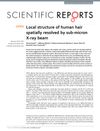 1 citations,
March 2023 in “Nutrients”
1 citations,
March 2023 in “Nutrients” The conclusion is that obesity should be managed with a slow, balanced approach to diet and exercise, with medication and surgery as additional options, and education and access to care are important.
 1 citations,
November 2021 in “Biomedicines”
1 citations,
November 2021 in “Biomedicines” Understanding how acne develops in different diseases could lead to new treatments.
 September 2024 in “Medicina”
September 2024 in “Medicina” Certain gene variations may protect against skin issues and oxidative stress in women with PCOS.
April 2024 in “Journal of clinical medicine” Recognizing specific skin features helps diagnose and manage lupus erythematosus effectively.
 October 2023 in “IntechOpen eBooks”
October 2023 in “IntechOpen eBooks” Genes and epigenetic changes are important in the development of Polycystic Ovary Syndrome.
 December 2022 in “International Journal of Current Science Research and Review”
December 2022 in “International Journal of Current Science Research and Review” Polycystic Ovary Syndrome (PCOS) is a common but often undiagnosed disorder in women that can cause irregular periods, infertility, and other symptoms, and can be managed with lifestyle changes, medication, and sometimes surgery.
 January 2022 in “IntechOpen eBooks”
January 2022 in “IntechOpen eBooks” Some lesser-known causes of PCOS include autoimmune issues, genetic mutations, and changes in the body's microbiome.

Hidradenitis Suppurativa has genetic links, with certain gene mutations more common in patients and a third of cases having a family history.
 7 citations,
July 2011 in “Survey of Ophthalmology”
7 citations,
July 2011 in “Survey of Ophthalmology” The document concludes that periocular hair disorders have various causes and treatments, and proper evaluation by specialists is important for management and prognosis.
 6 citations,
May 1993 in “Archives of Disease in Childhood”
6 citations,
May 1993 in “Archives of Disease in Childhood” Children's hair loss can be caused by many factors, including autoimmune diseases, emotional stress, genetics, and infections, with treatment and prognosis varying.
 75 citations,
March 2009 in “Journal of The American Academy of Dermatology”
75 citations,
March 2009 in “Journal of The American Academy of Dermatology” CCCA is a hair loss type affecting African women, possibly caused by grooming and chemicals, with various treatments and needing more research.
 288 citations,
June 2009 in “Human reproduction update”
288 citations,
June 2009 in “Human reproduction update” The modified Ferriman-Gallwey method is a useful tool for diagnosing hirsutism.
 73 citations,
June 2003 in “Journal of the American Academy of Dermatology”
73 citations,
June 2003 in “Journal of the American Academy of Dermatology” Dermatologists need to understand African American hair-care practices to better treat their hair and scalp disorders.
4 citations,
January 2022 in “Cosmetics” Avoid high-tension styles and use professional treatments to reduce hair damage and health risks.
 42 citations,
April 2008 in “Acta materialia”
42 citations,
April 2008 in “Acta materialia” Different ethnicities and treatments affect human hair strength and structure.
 40 citations,
May 2012 in “British Journal of Dermatology”
40 citations,
May 2012 in “British Journal of Dermatology” Recognizing specific features of African-American hair can help diagnose hair loss conditions.
 24 citations,
November 2015 in “Scientific reports”
24 citations,
November 2015 in “Scientific reports” Human hair has a new region with ordered filaments and the cuticle contains β-keratin sheets.
 18 citations,
August 2014 in “Lipids”
18 citations,
August 2014 in “Lipids” Human hair has more unsaturated fats inside than on the surface, and certain lipids may help bind the outer and inner layers together.
 2 citations,
September 2004 in “International Journal of Cosmetic Science”
2 citations,
September 2004 in “International Journal of Cosmetic Science” Hair quality is genetically determined and linked to its composition and strength.
 11 citations,
January 2013 in “Indian Dermatology Online Journal”
11 citations,
January 2013 in “Indian Dermatology Online Journal” CCCA is a common, progressive hair loss condition that may not always be linked to hair care practices and requires a biopsy for diagnosis.
 1 citations,
July 2012 in “Springer eBooks”
1 citations,
July 2012 in “Springer eBooks” The document concludes that more research is needed to better understand and treat scarring hair loss conditions.
 19 citations,
August 2011 in “Archives of Dermatology”
19 citations,
August 2011 in “Archives of Dermatology” CCCA is a common scarring hair loss in African descent women, possibly linked to genetics, hair care practices, and health issues like diabetes.
 6 citations,
December 2010 in “Journal of Cosmetic Dermatology”
6 citations,
December 2010 in “Journal of Cosmetic Dermatology” Apoptosis may contribute to hair loss in androgenetic alopecia.
 May 2017 in “InTech eBooks”
May 2017 in “InTech eBooks” Some hair loss disorders cause permanent loss due to scarring, and treatments like steroids don't always work well.
 May 2007 in “Dermatologic Therapy”
May 2007 in “Dermatologic Therapy” Hair care practices like using relaxers and tight braiding can lead to permanent hair loss in black women.
 13 citations,
March 2019 in “Journal of Dermatological Treatment”
13 citations,
March 2019 in “Journal of Dermatological Treatment” Finasteride can treat hair loss, but may have side effects; evaluate and inform patients of risks.
 32 citations,
January 2019 in “American Journal of Clinical Dermatology”
32 citations,
January 2019 in “American Journal of Clinical Dermatology” Minoxidil helps treat eyebrow thinning, monilethrix, early hair loss, and shortens chemo-related hair loss.
 January 2024 in “Molecules (Basel. Online)”
January 2024 in “Molecules (Basel. Online)” Juglone from walnut extracts may help repair damaged hair.
 13 citations,
March 2019 in “Journal of cosmetic dermatology”
13 citations,
March 2019 in “Journal of cosmetic dermatology” Heat damages hair, with Asian hair losing more protein than Caucasian hair.
 10 citations,
September 2020 in “Metabolites”
10 citations,
September 2020 in “Metabolites” Hair color and length affect metabolite profiles in hair, so they should be considered in hair analysis.



























